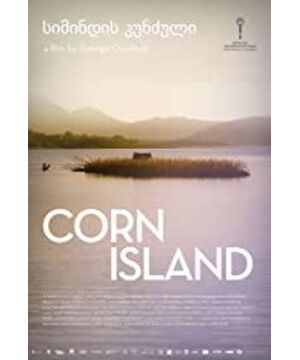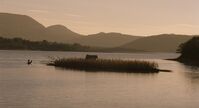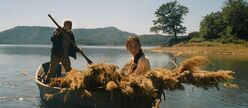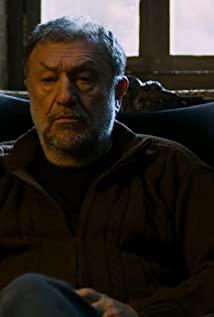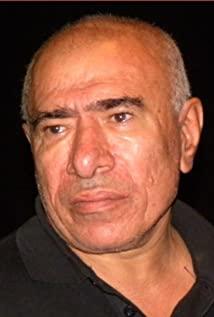The beginning of the film is made clear by a paragraph: every spring flood, the Inguri River washes the rocks and soils of the Caucasus region into the Black Sea, forming some land of Zhouzhu in its early stage. These Chauzhu lands are good news for the local farmers, who abandoned the flooded river banks to reclaim the sturdy and fertile Chauzhu lands. Between spring and autumn, they can grow enough corn to keep their families through the long, cold winters.
This text has basically introduced the content of the entire movie. That's right, "Island of Crops" is that boring. Oh no! It should be said that it is "simple and simple", so simple and simple that it can be summarized as "the grandfather and granddaughter built a house on a sandbar, and then planted some corn." The two protagonists not only have no names, but also have no relationship with the beauty. There are a few revealing shots of the granddaughter changing clothes in the film, but trust me, it won't evoke any desire in men.
So, you can relax while watching this movie, don't think about the ups and downs of the plot, just watch them work quietly. At the beginning, the old man came by boat, boarded the sandbar to check the soil quality, and then brought in some wood every day to start building the house. One day, I received help from my granddaughter. I lay on the sandbar to rest between labors. When I was hungry, I relied on the pickled and dried small fish in the river to satisfy my hunger. After building the house, the two began to sow corn, from the low grass seedlings to the stalks. Although the film has few dialogues, it is full of the gurgling sound of the river, the chirping of birds, the singing of frogs and insects, and the surrounding green mountains and green waters form an idyllic mood.
The director of the film is Georgian George Owashwilly, whose debut film "Happiness on the Other Side" was once submitted by Georgia to the Olympics, and currently has a score of 7.9 in IMDB. Unlike "Island of Crops", the former is a political film with children's fables, but it also has the same thing, that is, it all involves a place called "Abkhazia". Most viewers probably don't know anything about this place, so here's a brief introduction.
From the core of western Russia all the way south, you will reach the important Eurasian border, the Caucasus Mountains. This region has a complex structure. Since ancient times, it has been extremely independent and has caused headaches for foreign regimes. There are also more independent political entities and entities with such aspirations hidden here than anywhere in the world. In the northern foothills of the Caucasus Mountains, in Russia, there are inhabited areas divided by ethnic minorities such as Chechnya and Ingushetia. And over the Caucasus Mountains to the southern foot of Georgia, there are two de facto independent republics, Abkhazia and South Ossetia. Further south, to the border of Armenia and Azerbaijan, there is the Republic of Artsakh nestled in the mountains.
Although Abkhazia legally belongs to the territory of Georgia, the main inhabitants are Abkhazians and Russians. In the Greek era, it was an important trading center in the Black Sea. It has strong economic autonomy and a high sense of local identity. Georgia in Tbilisi has no interest. With the disintegration of the Soviet Union that year, Russia's ability to control the core areas of the former allied countries declined. In order to strengthen control and geographical interests, it quickly contacted the local government in Abkhazia and cooperated with them to become a separate entity. As a result, a situation of "Russia-Georgia-Abkhazia" three-way wrestling was formed. Georgia hoped to regain Abkhazia, while Abkhazia confronted it with Russian assistance.
After understanding this premise, look back at "Island of Crops". The background of this film is set in Abkhazia, and the protagonists and grandsons speak Abkhazian language. Even though the director has made a subtle treatment of political demands, there are still many scenes with political colors. For example, after the old man boarded the sandbar to survey the land, he stuck a branch on the ground and tied a white cloth, symbolizing the declaration of sovereignty; another example is the first dialogue in the film, where the granddaughter asks grandpa whether the sandbar belongs to Abkhazia or Georgia. The old man said it belonged to its creator; later, the film used blank gunshots, soldiers and boats constantly patrolling the nearby waters to show the frequent inter-ethnic conflicts here.
Although Abkhazia and Georgia are full of hatred in reality, this is not the case when it comes to ordinary people. In the film, the first contact between the grandparents and the grandchildren was when they found a wounded Georgian soldier in a cornfield. Even though they could not speak the language, they warmly treated the wound and brought him a chicken from home. Supplementary nutrition (compared to the grandparents and grandchildren who usually only eat some dried salted fish). When Abkhaz soldiers came to ask if they had found any suspicious people, the old man also assumed that he did not know, and tried his best to help him cover. It can be seen that kindness is one of the nature of human beings. For ordinary people, there will not be so much hatred and hatred, and there is not enough food to eat, where is there any time to care about politics?
So what are the demands of the people? In another conversation between the grandfather and grandson, the grandfather said to his granddaughter: "Your parents can't see you graduate, I hope God bless me to live to that day." Still so simple, the director didn't say anything about the girl's parents, but The audience can imagine what happened. These blanks in the film open up the audience's thinking logic, allowing the audience to personally participate in it and think about everything that happened on the Georgian soil and the suffering of the people.
"Island of Crops" flowed peacefully and poetically for a long time, but collapsed in the last ten minutes. When the grandparents and grandchildren's efforts for more than half a year bore heavy fruits, a sudden storm broke the joy of the harvest. The pouring rain caused the river to swell, tearing the sandbar inch by inch, and the two of them only managed to save part of the corn. The old man tried his best to push away the boat loaded with food and his granddaughter, but his house collapsed without escape. At the end, in another spring, another peasant landed on Zhouzhu and dug up his granddaughter's rag doll, just like the old man dug out a small cigarette holder left by his predecessors. In addition to showing political issues in a roundabout way, the biggest theme of the film is actually to use the tragedy of farming on the island as a metaphor for the situation of the cycle of life. After all, it is difficult for people who rely on the sky to escape the cycle of hope and tragedy, but the departure of the old man also heralds the growth of the granddaughter.
♑
View more about Corn Island reviews


